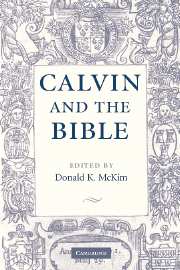Book contents
- Frontmatter
- Contents
- Notes on contributors
- Preface
- List of abbreviations
- 1 Calvin as commentator on Genesis
- 2 Calvin as commentator on the Mosaic Harmony and Joshua
- 3 Calvin as an interpreter of Job
- 4 Calvin as commentator on the Psalms
- 5 Calvin as commentator on the Prophets
- 6 Calvin as commentator on the Synoptic Gospels
- 7 Calvin as commentator on the Gospel of John
- 8 Calvin as commentator on the Acts of the Apostles
- 9 Calvin as commentator on the Pauline epistles
- 10 Calvin as commentator on Hebrews and the Catholic Epistles
- 11 John Calvin as an interpreter of the Bible
- Index
7 - Calvin as commentator on the Gospel of John
Published online by Cambridge University Press: 09 November 2009
- Frontmatter
- Contents
- Notes on contributors
- Preface
- List of abbreviations
- 1 Calvin as commentator on Genesis
- 2 Calvin as commentator on the Mosaic Harmony and Joshua
- 3 Calvin as an interpreter of Job
- 4 Calvin as commentator on the Psalms
- 5 Calvin as commentator on the Prophets
- 6 Calvin as commentator on the Synoptic Gospels
- 7 Calvin as commentator on the Gospel of John
- 8 Calvin as commentator on the Acts of the Apostles
- 9 Calvin as commentator on the Pauline epistles
- 10 Calvin as commentator on Hebrews and the Catholic Epistles
- 11 John Calvin as an interpreter of the Bible
- Index
Summary
In his preface to his 1553 commentary on the Gospel of John, Calvin joined a long line of Christian thinkers in expressing high esteem for the Fourth Gospel's unique teaching. Although all four gospels, he claims, aim to make Christ known, the first three exhibit his “body,” whereas John exhibits his “soul.” Despite this traditional-sounding affirmation of John's special character, Calvin's commentary occupies a singular place in the history of Johannine interpretation. Specifically, it represents the culmination of certain sixteenth-century approaches to the Fourth Gospel, redefining its “spiritual” character and reversing traditional views that this gospel offered more advanced and difficult teaching than Matthew, Mark, and Luke. Moreover, the commentary marks an important stage in Calvin's exegetical activity and his career in Geneva. This was Calvin's first gospel commentary, and it was published in the midst of what was clearly the most turbulent period in his time in the city. He discussed these trials in his dedication to the syndics and town council – a cagey political move, given that the majority of the members of the council were in fact sympathetic to Calvin's opposition. Protesting the charges of excessive severity and reminding these magistrates of their duty to refute the slanders against him, Calvin reasoned that it was important to have a special monument to his teaching – namely, this commentary – inscribed with their name.
- Type
- Chapter
- Information
- Calvin and the Bible , pp. 164 - 198Publisher: Cambridge University PressPrint publication year: 2006
- 2
- Cited by

